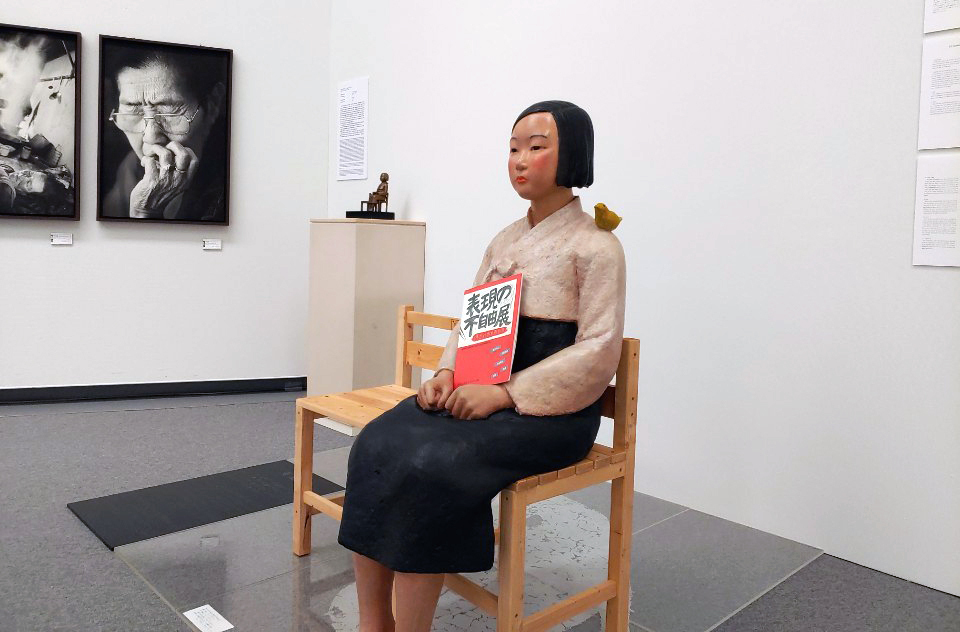An exhibition of a statue representing victims of wartime sexual slavery by the Japanese military has been shut off to the public following pressure from the Japanese government and right-wing civic groups.
Organizers of the Aichi Triennale 2018, a Japanese international art show, have closed off the area displaying the statue created by two South Korean artists. It was the first-ever museum exhibition of the “Statue of a Girl of Peace” in Japan. Similar statues are displayed in Seoul and other Korean cities as well as a number of cities overseas.
 |
This photo taken Thursday by artist Kim Un-seong shows the “Statue of a Girl of Peace” on display at the 2019 Aichi Triennale in Nagoya, Japan. (Yonhap) |
The decision to remove the statue from view was made three days after Thursday’s opening of one of Japan’s largest contemporary art festivals, held in Nagoya. As of Sunday, the entrance to the gallery space occupied by the statue had been blocked.
On Friday, Japan’s Chief Cabinet Secretary Yoshihide Suga first said he would check with the organizers whether prior notice was given about the inclusion of the statue when it received financial assistance from the Agency for Cultural Affairs of Japan.
Nagoya Mayor Takashi Kawamura on Friday also demanded in a letter to Omura -- governor of Aichi Prefecture and chairman of the festival organizing committee -- that the statue to be removed, arguing the government’s financial resources should not be spent on showcasing the statue.
Aichi Triennale officials, in a press conference Saturday, officially announced they would close the section, mainly due to growing safety concerns. Omura added that the triennial had received many emails, phone calls and faxes that threatened public safety at the event.
The section at the Aichi Prefectural Museum of Art comprising the statue and photographs of the victims will be replaced by other exhibits, according to a triennial official.
On the issue, experts, civic groups and the art scene have expressed worries over the alleged censorship of the event.
Amid the intensifying debate over the issue, two Korean artists, Park Chan-kyong and Lim Min-ouk, on Sunday decided to withdraw their works from the art festival being held under the title of “Taming Y/Our Passion”
The two artists requested that the triennial allow them to post a notice that says “against censorship” in their exhibition space the previous day, but the organizers refused the request.
Meanwhile, it has been reported that Japan allegedly pressured German museums to remove similar statues from display.
According to local news reports Sunday, the Japanese Embassy in Germany recently sent an official letter to Berlin-based museum Gemeinschaft der Kunstlerinnen und Kunstfordernden, or GEDOK, protesting the museum’s inclusion of a sculpture of a sexual slavery victim in its latest exhibition “Toys Are Us,” which kicked off Friday.
Japan’s efforts to curb exhibitions of statues related to sexual slavery have been ongoing in Germany for several years.
In January 2018, Ravensbruck Memorial, located in Brandenburg, Germany, decided to remove a similar bronze statue, allegedly after Japan’s meddling, according to Korea Verband, a nonprofit association based in Berlin.
The museum -- founded to commemorate victims of the largest concentration camp for women built in Germany during World War II -- had shown the statue after Korea Verband’s Chairperson Han Jung-hwa donated it in 2017.
In June 2018, the Japanese Consulate General in Dusseldorf also allegedly pressured a local exhibition in Dortmund, western Germany, to remove a similar statue.
In March 2017, the Japanese government demanded local authorities remove another statue on display at the Nepal Himalaya Pavilion in Wiesent, Germany, which led to removal of descriptions of the statue.
By Shim Woo-hyun (
ws@heraldcorp.com)








![[Weekender] Korea's traditional sauce culture gains global recognition](http://res.heraldm.com/phpwas/restmb_idxmake.php?idx=644&simg=/content/image/2024/11/21/20241121050153_0.jpg)